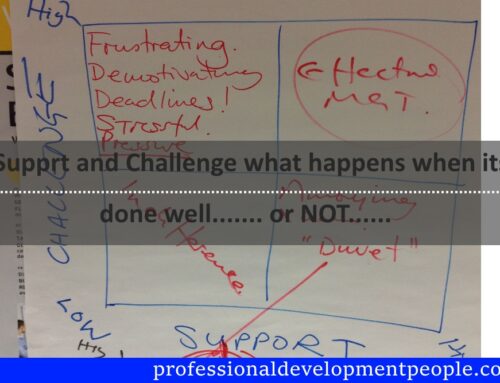 Behavioural contracting, the way forward
Behavioural contracting, the way forward
Have you ever been on a training course where someone has an axe to grind from moment one, and does it all the way through the course? Then behavioural contracting is the way forward for you!
Why is behavioural contracting the way forward?
The purpose of a behavioural contract is to allow people the freedom to behave, in positive ways, so that they get the most from an event. Many of my colleagues view this as some kind of chore that has to be achieved, in the same way you would give out health and safety briefings.
I felt like this until about three years ago. On a day that I didn’t bother doing one!
Picture the scene.
A law enforcement organisation, middle and senior managers all of whom had been told to attend the session, but were there because of the “fear” of non-attendance, rather than the outside chance that they might learn something.
A particularly vocal individual suggested we get on with things, instead of going through the usual “crap”. So naively I did. The outcome, bickering, back biting and general anarchy.
It took me back to my earliest teacher training days when as a first year PE teacher I asked someone to throw me a basketball and a dozen 14 year old boys all threw the ball at me! NEVER AGAIN!
So I had to really lay the law down with the law enforcers and had a battle of a day, but rescued it.
So the learning?
Having been in a really difficult situation, I didn’t lose the group, but it was darn close. I vowed NEVER to be there again. I now take behavioural contracting, as the way forward really seriously. Every event that we do will include some aspect of the expected behaviours from delegates.
A typical outcome is shown here  the detail of the contract will vary from group to group, but the principle of having an influence over the behaviours of the group is critical. It enables anyone, from junior to senior colleagues to say ” hang on, we agreed we would listen, I don’t feel I am being listened to…” Powerful stuff.
the detail of the contract will vary from group to group, but the principle of having an influence over the behaviours of the group is critical. It enables anyone, from junior to senior colleagues to say ” hang on, we agreed we would listen, I don’t feel I am being listened to…” Powerful stuff.
So when someone starts the axe grinding what options are available? Obviously there are several, the most powerful one is where another delegate suggests that the behaviour is outside our agreement. This always leads to a brilliant discussion around acceptable behaviours, power and the greater good.
Occasionally when the transgressor is more senior it allows me to intervene without causing embarrassment.
SUMO
No, not the big Japanese chaps. Sum Up and Move On. This methodology enables us to stay on track, to not go around the houses or down any pointless rabbit holes. In the agreement there is a tacit mention of this and when we might need it.
NOT using SUMO is like being in an endless “any other business” part of a meeting. Futile and demoralising.
Moving out of the classroom
Behavioural contracting, the way forward. Many of my clients believe so, they have taken the principles out of the classroom and gone back to work t on team driven behavioural contracting.
How powerful would your workplace be if people really felt they could contribute without fear. What would that do to your levels of innovation?
PDP are here to help you get it right. Contact us for advice.





